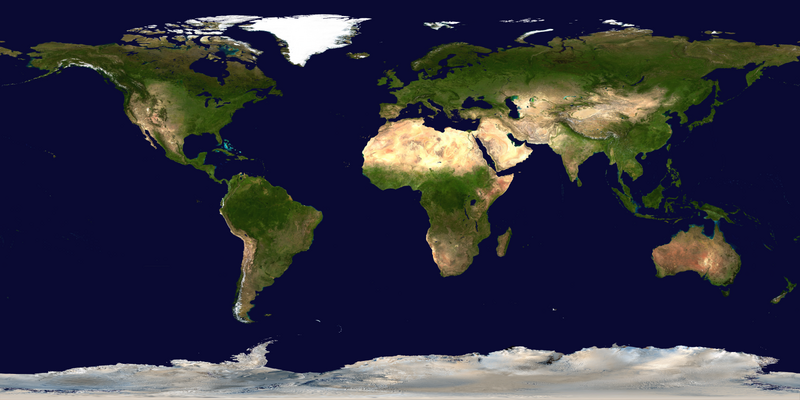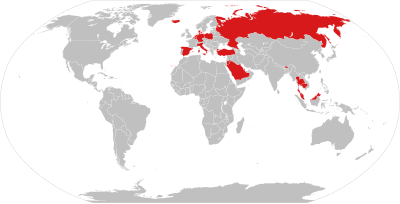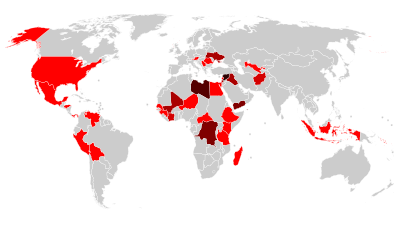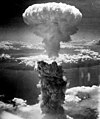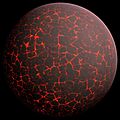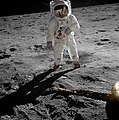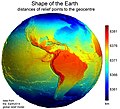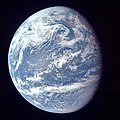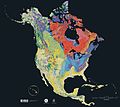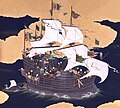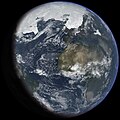Portal:World
The World Portal

The world is the totality of entities, the whole of reality, or everything that exists. The nature of the world has been conceptualized differently in different fields. Some conceptions see the world as unique while others talk of a "plurality of worlds". Some treat the world as one simple object while others analyze the world as a complex made up of parts.
In scientific cosmology, the world or universe is commonly defined as "[t]he totality of all space and time; all that is, has been, and will be". Theories of modality talk of possible worlds as complete and consistent ways how things could have been. Phenomenology, starting from the horizon of co-given objects present in the periphery of every experience, defines the world as the biggest horizon or the "horizon of all horizons". In philosophy of mind, the world is contrasted with the mind as that which is represented by the mind. Theology conceptualizes the world in relation to God, for example, as God's creation, as identical to God or as the two being interdependent. In religions, there is a tendency to downgrade the material or sensory world in favor of a spiritual world to be sought through religious practice. A comprehensive representation of the world and our place in it, as is found in religions, is known as a worldview. Cosmogony is the field that studies the origin or creation of the world while eschatology refers to the science or doctrine of the last things or of the end of the world.
In various contexts, the term "world" takes a more restricted meaning associated, for example, with the Earth and all life on it, with humanity as a whole or with an international or intercontinental scope. In this sense, world history refers to the history of humanity as a whole and world politics is the discipline of political science studying issues that transcend nations and continents. Other examples include terms such as "world religion", "world language", "world government", "world war", "world population", "world economy", or "world championship". (Full article...)
Selected articles -
General images -
Megacities of the world -
São Paulo (/ˌsaʊ ˈpaʊloʊ/, Portuguese: [sɐ̃w ˈpawlu] ⓘ; Portuguese for 'Saint Paul') is the most populous city in Brazil and the capital of the state of São Paulo. Listed by the GaWC as an alpha global city, São Paulo is the most populous city outside of Asia and the world's 20th-largest city proper by population. Additionally, São Paulo is the largest Portuguese-speaking city in the world. It exerts strong international influences in commerce, finance, arts, and entertainment. The city's name honors the Apostle, Saint Paul of Tarsus. The city's metropolitan area, the Greater São Paulo, ranks as the most populous in Brazil and the 12th-most-populous on Earth. The process of conurbation between the metropolitan areas around the Greater São Paulo (Campinas, Santos, Jundiaí, Sorocaba and São José dos Campos) created the São Paulo Macrometropolis, a megalopolis with more than 30 million inhabitants, one of the most populous urban agglomerations in the world.
Having the largest economy by GDP in Latin America, the city is home to the São Paulo Stock Exchange. Paulista Avenue is the economic core of São Paulo. The city has the 23rd largest GDP in the world, representing 10.7% of all Brazilian GDP and 36% of the production of goods and services in the state of São Paulo, being home to 63% of established multinationals in Brazil, and was responsible for 28% of the national scientific production in 2005, as measured by the number of science papers published in journals. (Full article...)Did you know -

- ... that despite losing his left arm in World War II, Austrian tennis player Hans Redl reached the fourth round at Wimbledon in 1947?
- ... that in 2023 the IFLA named the Biblioteca Gabriel García Márquez the "best new public library in the world"?
- ... that decades after the type specimen of the lichen Punctelia graminicola was destroyed in World War II, its original name was restored after another specimen was rescued from disposal at a dump?
- ... that since 1977, a world constitution has existed alongside a Provisional World Parliament?
- ... that View from Williamsburg, Brooklyn, on Manhattan, 9/11 taken on the day of the attacks on the World Trade Center was not published until 2005 because it seemed too pretty to its creator Thomas Hoepker?
- ... that Ron Labinski has been described as the world's first sports-venue architect?
- ... that the archaeologist Alan Wace worked undercover for British intelligence during both world wars?
- ... that Earth 300 has designed a climate research vessel that would include a molten salt reactor and a quantum computer?
Countries of the world -

Eritrea (/ˌɛrɪˈtriːə/ ⓘ ERR-ih-TREE-ə or /-ˈtreɪ-/ -TRAY-; Tigrinya: ኤርትራ, romanized: Ertra, pronounced [ʔer(ɨ)trä] ⓘ), officially the State of Eritrea, is a country in the Horn of Africa region of Eastern Africa, with its capital and largest city at Asmara. It is bordered by Ethiopia in the south, Sudan in the west, and Djibouti in the southeast. The northeastern and eastern parts of Eritrea have an extensive coastline along the Red Sea. The nation has a total area of approximately 117,600 km2 (45,406 sq mi), and includes the Dahlak Archipelago and several of the Hanish Islands.
Human remains found in Eritrea have been dated to 1 million years old and anthropological research indicates that the area may contain significant records related to the evolution of humans. The Kingdom of Aksum, covering much of modern-day Eritrea and northern Ethiopia, was established during the first or second century AD. It adopted Christianity around the middle of the fourth century. Beginning in the 12th century, the Ethiopian Zagwe and Solomonid dynasties held sway to a fluctuating extent over the entire plateau and the Red Sea coast. Eritrea's central highlands, known as Mereb Melash ("Beyond the Mereb"), were the northern frontier region of the Ethiopian kingdoms and were ruled by a governor titled the Bahr Negash ("lord of the sea"). In the 16th century, the Ottomans conquered the Eritrean coastline. Beginning in 1882–1885, Italian troops systematically spread out from Massawa toward the highland, eventually resulting in the formation of the colony of Italian Eritrea in 1889. After World War II, Eritrea was administered by the British Military Administration until 1952. Following the UN General Assembly decision in 1952, Eritrea would govern itself with a local Eritrean parliament, but for foreign affairs and defense, it would enter into a federal status with Ethiopia for ten years. However, in 1962, the government of Ethiopia annulled the Eritrean parliament and formally annexed Eritrea. The Eritrean secessionist movement organised the Eritrean Liberation Front in 1961 and fought the Eritrean War of Independence until Eritrea gained de facto independence in 1991. Eritrea gained de jure independence in 1993 after an independence referendum. (Full article...)Related portals
Protected areas of the world -
The time allocated for running scripts has expired. The time allocated for running scripts has expired.
The time allocated for running scripts has expired.
- List of Olympic records in athletics
- List of world records in athletics
- List of junior world records in athletics
- List of world records in masters athletics
- List of world youth bests in athletics
- List of IPC world records in athletics
- List of world records in canoeing
- List of world records in chess
- List of cycling records
- List of world records in track cycling
- List of world records in finswimming
- List of world records in juggling
- List of world records in rowing
- List of world records in speed skating
- List of world records in swimming
- List of IPC world records in swimming
- List of world records in Olympic weightlifting
The time allocated for running scripts has expired.
The time allocated for running scripts has expired.
The time allocated for running scripts has expired.
The time allocated for running scripts has expired.
The time allocated for running scripts has expired.
The time allocated for running scripts has expired.
The time allocated for running scripts has expired.
The time allocated for running scripts has expired.
The time allocated for running scripts has expired.
The time allocated for running scripts has expired.
The time allocated for running scripts has expired.
The time allocated for running scripts has expired.
The time allocated for running scripts has expired.
The time allocated for running scripts has expired.
The time allocated for running scripts has expired.
The time allocated for running scripts has expired.
The time allocated for running scripts has expired.
The time allocated for running scripts has expired.

The time allocated for running scripts has expired.
The following Wikimedia Foundation sister projects provide more on this subject:
-
Commons
Free media repository -
Wikibooks
Free textbooks and manuals -
Wikidata
Free knowledge base -
Wikinews
Free-content news -
Wikiquote
Collection of quotations -
Wikisource
Free-content library -
Wikispecies
Directory of species -
Wikiversity
Free learning tools -
Wikivoyage
Free travel guide -
Wiktionary
Dictionary and thesaurus
The time allocated for running scripts has expired.

